Archive
Bhutanese Faculty in Vienna 2023
In January 2023, we had the pleasure of hosting three visiting faculty from the JSW School of Law in Bhutan. Karma Choeden, Ugyen Thinley, and Mahesh Gajmer came to conduct research in their respective fields and to establish connections with our faculty and staff.
Karma Choeden's research focused on Law and Economics, and she was able to connect with Professor Peter Lewisch to discuss their shared interests. Ugyen Thinley, the Chief Librarian at the JSW School of Law, also made valuable connections with the heads of our university library and with Professor Palme, who led us on a tour of the Papyrus Collection at the National Library.
Mahesh Gajmer's research centered on Intellectual Property and indigenous textiles and medicinal plants. He gave a public presentation on this topic, which was well-received by our faculty and students.
Bhutanese Students in Austria 2022
From December 8th to 23rd, 2022, four students from the JSW School of Law visited our faculty. On December 13th and 14th, a workshop was held, which was attended by various faculty members and students. Our guests from Bhutan began by giving a lecture on law, culture, and society in Bhutan. We then focused on various aspects of the "Oral Legal History in Bhutan" project.
The workshop provided a unique opportunity for our faculty and students to learn about the legal system and culture of Bhutan, as well as to exchange ideas and experiences with our guests. The discussions were lively and engaging, and we were impressed by the depth of knowledge and insight that our visitors brought to the table.
Overall, the visit was a great success, and we look forward to continuing our collaboration with the JSW School of Law in the future. We believe that such exchanges are essential for promoting cross-cultural understanding and for advancing legal scholarship and practice around the world.
New Publication
In July 2019 Michaela Windischgraetz and Rinzin Wangdi launched their book “The Black-Slate Edict of Punakha Dzong”, which provides an introduction to and a translation of an inscription from the 18th century engraved on black slates at Punakha Dzong. The inscription contains a legal code of Zhabdrung Ngawang Namgyal, the founder of the Bhutanese state.
Bhutanese faculty in Vienna
In August 2019 Tshering Dolkar, a junior lecturer from JSW Law, completed a one-month research stay at the Department of Prof. Iris Eisenberger at BOKU University. It was the first visit in a series of planned research stays of young Bhutanese faculty in Austria, with the aim of strengthening legal research in Bhutan. On 6 August 2019, Tshering Dolkar presented her research paper project on legal personhood in Environmental Law. She compared cases from different jurisdictions to discuss how treating natural objects as legal persons with rights and duties would impact Bhutanese Law. In her presentation, Tshering Dolkar showed that both the motives behind the examined cases and the respective legal consequences vary significantly.
Conference on Globalisation in Asia, Thimphu 2019
Conference on Globalisation in Asia, Thimphu 2019
From July 17-19 2019 Michaela Windischgraetz attended a conference on “Public Law, Legal Orders & Governance – Regulating Globalisation in Asia”, organized by the University of Victoria, Canada and our partner university JSW Law. She presented a paper on “The Zhabdrung´s Law - Nation-building on Global Buddhist Ideas”. During the conference, Michaela Windischgraetz and Rinzin Wangdi launched their book “The Black-Slate Edict of Punakha Dzong”.
ISBS Conference, Oxford
From Jan 8-10, Michaela Windischgraetz attended the inaugural conference of the International Society for Bhutan Studies (ISBS) at Magdalen College, University of Oxford. She presented a paper on „Dispute settlement in a changing society“, exploring the reasons why Bhutanese citizens increasingly use court litigation to settle their disputes and what advantages traditional village mediation might still have.
Environmental Law at JSW Law
In February 2019, Iris Eisenberger taught the first part of a joint course on Environmental Law. Iris co-taught with Tshering Dolkar, a young Bhutanese faculty lecturer, who will eventually take over the course. This first part of the course focused on International Environmental Law. Tshering will continue with teaching the Bhutanese legislation on environmental matters and Armin Rosencranz, Professor at OP Jindal Global University in India, will complement the programme with case law studies.
Buddhist Legal History at JSW Law
In February 2019, Michaela Windischgraetz taught the first part of a course on Buddhist Legal History. She started with exploring the foundations of Buddhist Law in the law of ancient India as it appears in the Vinayas. After that, the focus shifted on pre-buddhist law in Tibet and the reception of Buddhist legal ideas in Tibet. Following the further development of law in Tibet, the implementation of law in Bhutan by Zhabdrung Ngawang Namgyal, the founder of Bhutan, who as a Tibetan was heavily influenced by Tibetan legal thought, completed the course.
Visiting Scholar Lecture Series at the Research Center of JSW Law
On February 27, Michaela Windischgraetz gave a lecture on „Crime and Punishment in Pre-Buddhist Tibet“ at the Research Center of JSW Law. She introduced various important legal documents from the Old Tibetan Empire and discussed the impact Buddhism might have had on the Tibetan Law.
Activities 2018
Course on Jurisprudence and Statutory Interpretation
In August 2018, Stefan Hammer taught a course on jurisprudence and statutory Interpretation together with a Buthanese colleague, Tenzin Leewan. As contrasted with Buthanese legal history and its Buddhist background, the discussion of Western influences on legal thought, marked by a sharp distinction between morality and justice on the one side and positive law on the other, proved to be particularly interesting. Likewise, central elements of political philosophy could be contextualized by addressing central features of the Bhutan’s Constitutional and political system under a comparative perspective. As Bhutan understands itself as a country whose modernized legal system combines common law and civil law traditions, the idea and role of codification was another main topic. This offered opportunities also to discuss different theories of legal reasoning reflecting both legal traditions. Tenzin Leewan further deepened methodological aspects with a focus on judicial practice.
Conference on Gross National Happiness and Law 2018
On the 17th and the 18th of July 2018 the JSW School of Law hosted an inaugural conference on Gross National Happiness and Law in Thimphu. Bhutan's Constitution lists as a ´Principle of State Policy´ that its Government shall strive to promote those conditions that will enable the pursuit of Gross National Happiness. From our side three colleagues took part and gave their presentations: Wolfram Schaffar gave an overview on ´Alternative development strategies worldwide´, Stefan Hammer talked about ´Principles & Policies in a Written Constitution: Justiciability and Impact on the Legal Standing of the Citizens´ and Michaela Windischgraetz moderated a panel on Buddhism and Law, which explored the impact of Bhutan's Buddhist traditions on the practice of law in Bhutan.
Course on Human Dignity
In March/April 2018, Christina Binder taught a course on Human Dignity. Christina Binder co-taught with Stephan Sonnenberg and Dema Lham. Dema Lham, a senior Bhutanese faculty lecturer, will eventually take over the course. The interdisciplinary course focused on human rights as centrally anchored in the concept of human dignity. It dealt with the functioning of the international system of human rights protection, the interplay of NGOs with other actors in human rights protection, domestic litigation, philosophical anthropological foundations of human rights as well as human responsibilities. The course included case studies and group work which should prepare students for Legal Clinics and the practical application of human rights which will be the focus of the fourth and fifth year of studies.
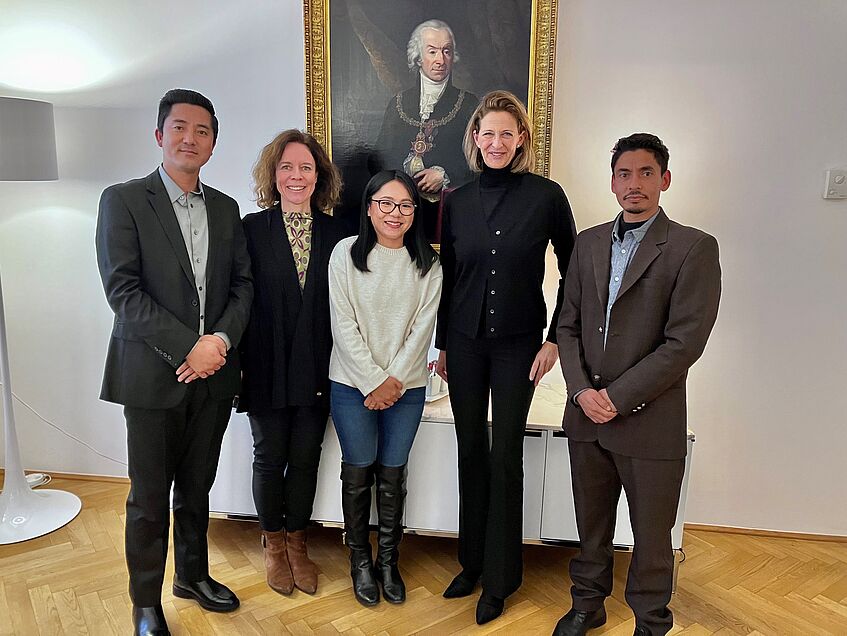
Meeting our Dean Prof. Zöchling-Jud
.
.
.
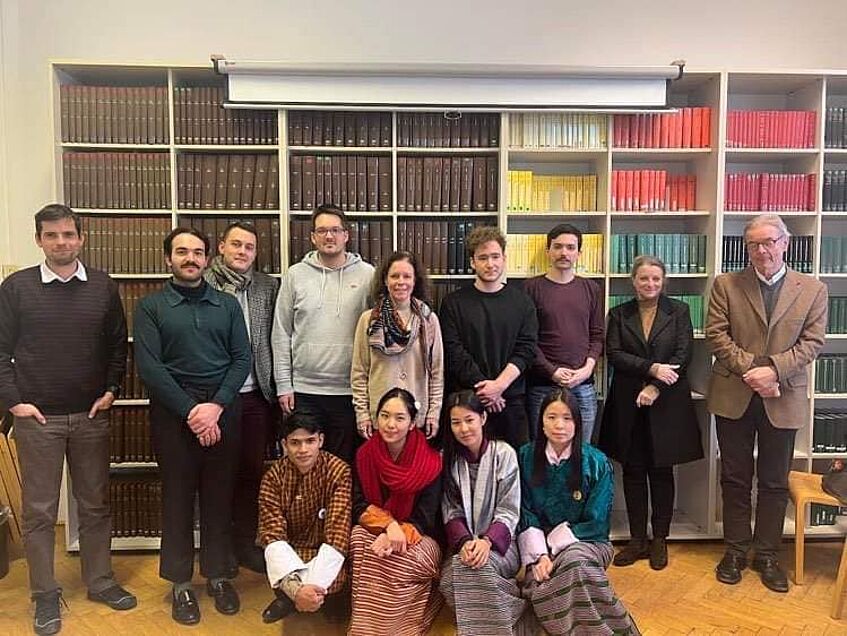
Bhutanese Students with Austrian Law Professors and Students
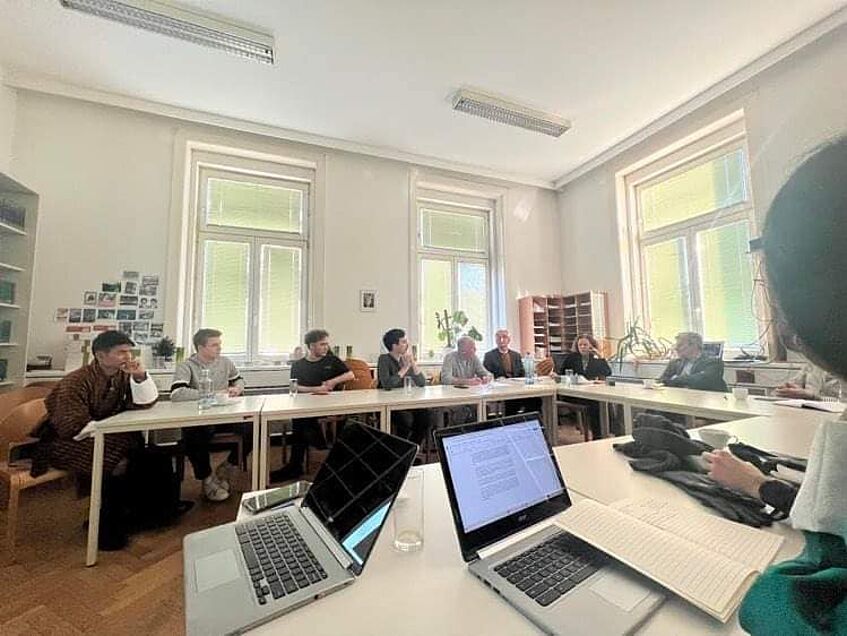
Research workshop about Bhutan and Laws
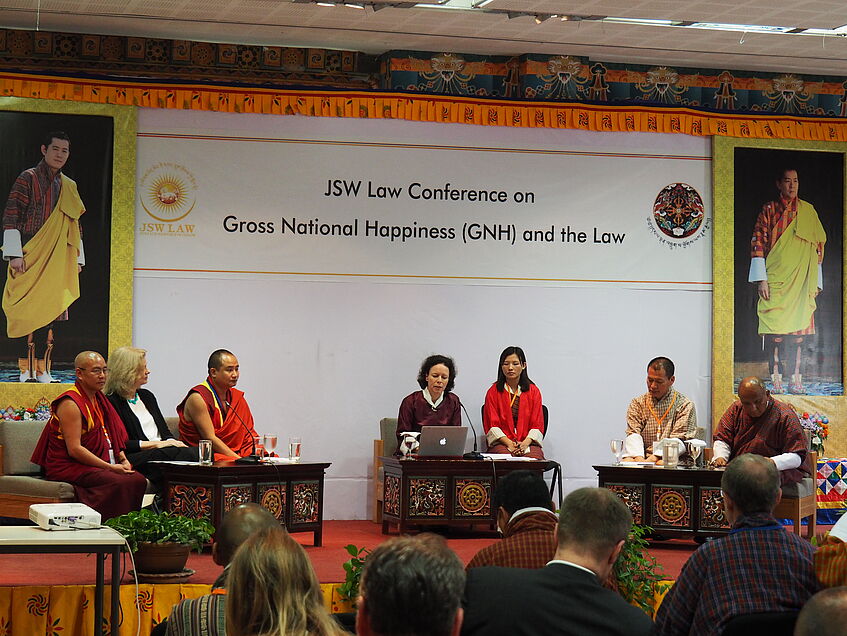
Panel with Professor Windisch-Graetz at the conference
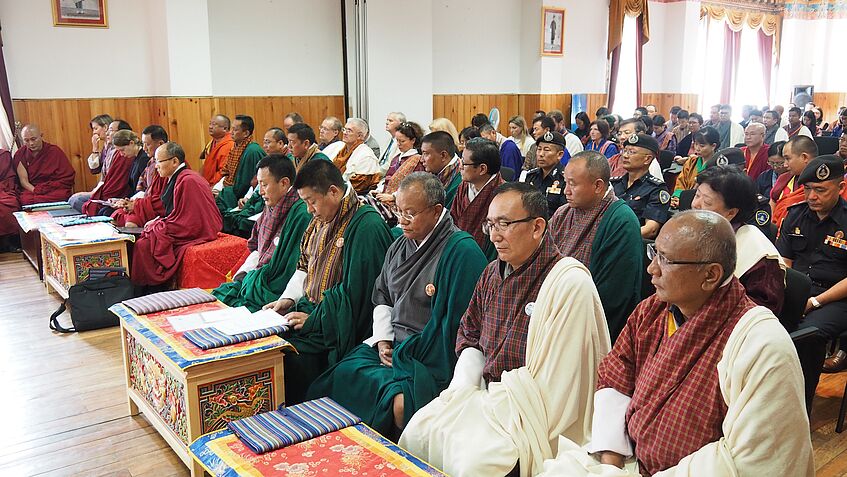
Conference on Gross National Hapiness and Law
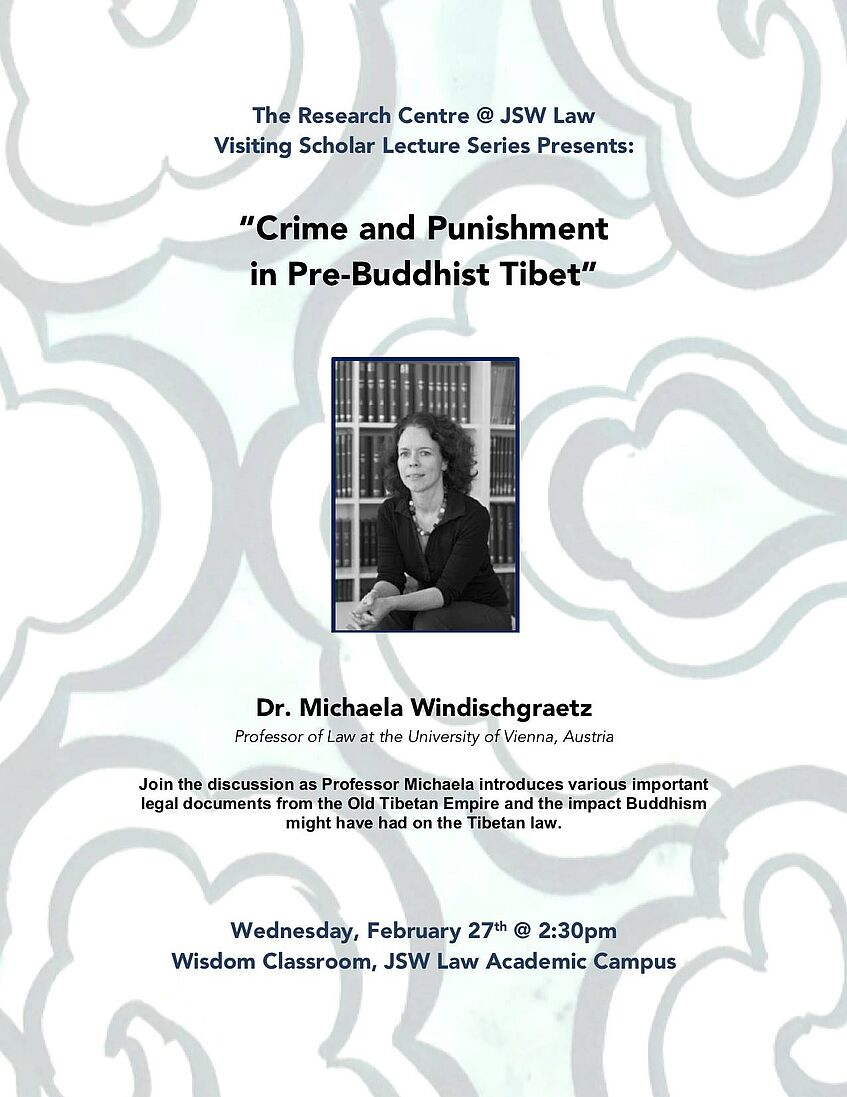
Visiting Scholar Lecture Series at JSW Law
